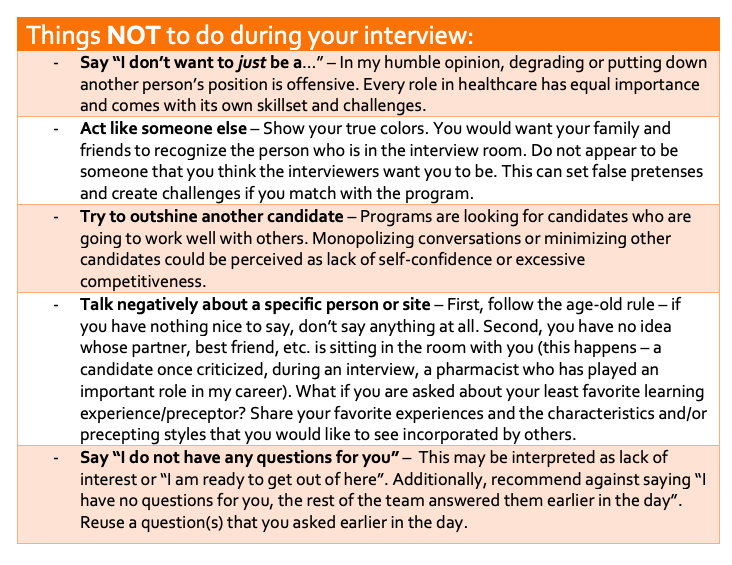Share this post:
Author: Kristin Watson, PharmD, BCCP
I have had the privilege of practicing pharmacy for over 15 years. I have participated in a fair share of pharmacy resident and fellowship interviews. I have had candidates “wow” me during their interviews and others who were a little rough around the collar. In this blog post, I provide suggestions for optimizing your interview techniques based my own observations. These are the most common interview tips that I share with our students and residents who are pursuing a post-graduate year one and/or two residency.
Tip 1: Practice Your Introduction Statement Over and Over, and then Some More
The first question received on most interviews is going to be “Tell me (us) a little bit about yourself.” This answer needs to be prepared without sounding rehearsed when you respond. Share things that are not already listed in your curriculum vitae – why did you go into pharmacy and/or why are you pursuing this specific position. Personally, I am looking for a cardiology pharmacy residency candidate who loves the heart and cardiac medications as much as our team does. Folks want to hear passion come through as you discuss why you are interviewing for their program. Although it is nerve-wracking, try to show your personality when providing your answer. Let your interviewers know a little bit about your personal side, too – are you a runner? do you love to cook? You never know, a person on the other side of the table may have the same interests. This could lead to a personal connection and allow you to stand out from other candidates. Part of the interview process is ensuring a person-program fit.
Suggest keeping your response to 60 -90 seconds; it definitely should not take longer than 2 minutes. Practice your answer in front of people who will provide honest feedback. Revamp your opening statement if people look bored or disinterested.
Tip 2: Do Your Homework
Review the residency website and program listing in the ASHP Residency Directory. Familiarize yourself with the content, even if you reviewed these resources before residency showcases and/or submitting your application. Look at these materials at least two days before the interview to allow you to digest the information. It is important to recognize that each program’s website may not be as robust as another. Each program has a different degree of resources available. I recommend that you do not form an opinion of a residency program based on the design and amount of content on their website.
Come to the interview with specific follow-up questions about what you have already learned about the program. Asking questions about information that is readily available on the program’s website may be off-putting to an interviewer as it can be perceived that time was not taken to prepare for the interview. Also, many programs will provide you a list of preceptors that you will meet during your interview. Alternatively, a list of preceptors may be available on the program’s website. See what you can find out about an individual’s area(s) of interest, recent publications, etc. Ask specific questions about one’s job responsibilities or their career path. Take time to read about the institution, practice site, school/college, etc. where your training will occur and ask questions related to what you researched. Do not be embarrassed to show that you prepared for the interview.
Finally, do not forget to review your curriculum vitae. You may be asked about a project, presentation or organizational activity with which you were involved. Be prepared with a one to two minute summary of the work. Discuss what you’ve learned from the experience. Be prepared to discuss, if asked, if there was anything that you would change if you had to do it all over again.
Tip 3: Turn Lemons into Lemonade
You are going to be asked questions about challenging situations on rotations and/or during school/residency. First, have a situation prepared to discuss. Talk about what you learned from this experience and how this has enabled you to grow. Discuss what you would do differently if you were in a similar situation again. We have all had failures and can grow from them. Do not be afraid to share yours.
You will likely be asked to identify an area(s) in which you would like to improve. Self-reflection is a skill that is necessary during residency training, so interviewers will be looking for that in your response. Prepare for this type of question. As you do so, reflect on strategies that you have taken to grow. Do not be afraid to talk about specific feedback that a preceptor gave you. Discuss how you have worked to progress based on preceptor’s input. Program directors and preceptors love to know that candidates are receptive and willing to improve based on feedback. Do not say that you have no areas for improvement because no one is expected to be perfect.
Tip 4: Figure Out if the Program is a Good Fit for You
The interview processes is just as important for you to learn about a program as it is for a program to evaluate you. Pay attention to the dynamics between members of the residency team (e.g., residents, preceptors, administrators). Consider how members of the program made you feel during your interview. Would you feel comfortable training at the site based on what you perceive their culture to be?
You can also learn a great deal by asking questions. Write out a list of questions before the interview based on priorities that are important for you in a residency program. If the itinerary is provided, write down three to four questions that you would like to ask during each portion of your interview. It is OK to refer to them during your interview. It can be helpful to ask the same question during more than one interview slot. You will want to compare and contrast answers received.
Some general questions for program directors and/or preceptors include:
- How do you orient learners to your rotation?
- How you modify your rotation for each learner based on prior experiences and interest?
- Can you tell me about a change you made to the residency program (or your rotation) in the last 1-2 years? What impact has that had on the program (or your rotation)?
Tip 5: Sleep, hydrate and eat!
Last but not least, you do not want to run out of fuel because you are tired, hungry or thirsty. You must get a good night of sleep before each interview. You are most likely going to be nervous for your interview. Every time I get nervous, I am remember what a mentor told me…”you feel this way because you care about what you are about to do”. Despite feeling nervous, you must eat and drink water before the interview. Do not skip caffeine if you are used to having some each morning; the last thing you want is a headache. Programs often will offer water throughout the interview day, but it never hurts to bring your own bottle. You will be amazed at how much talking you do!
Check out resources on job websites as your prepare for your interview. To this day, I still remember practicing answers, on my way to my first residency interview, to sample questions that were on Monster.com. It was a huge help and this preparation enabled me to feel more confident during my interviews. Consider these sites:
- https://www.indeed.com/career-advice/interviewing/how-to-introduce-yourself-in-an-interview
- https://www.monster.com/career-advice/article/sell-yourself-job-interview-hot-jobs
- https://www.careerbuilder.com/advice/the-perfect-answers-to-10-common-job-interview-questions
 Take a deep breath! You’ve got this!
Take a deep breath! You’ve got this!
 |
Kristin Watson, PharmD, BCCP
|
Reviewed by: Sandeep Devabhakthuni, PharmD, BCCP
Share this post:
